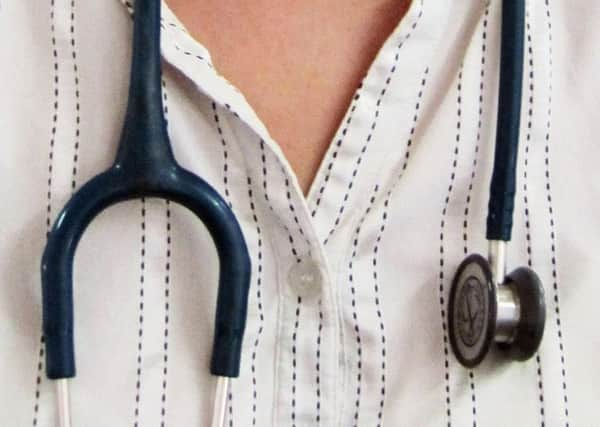GPs warn patients' safety at risk from care crisis


A comprehensive survey of 5,000 GPs, conducted by the British Medical Association (BMA), has mapped a stark picture of increasing pressures in general practice across the country.
More than eight out of 10 GPs felt their workload was unmanageable or excessive, the survey found, with Yorkshire cited as being one of the hardest hit areas of the country.
Advertisement
Hide AdAdvertisement
Hide AdIncreasing time pressures and staffing shortages, coupled with contracting budgets, doctors said, were directly impacting on the quality and safety of patient care they could provide.
“We are facing a crisis in general practice and community service which the Government has to address,” said Leeds GP Dr Richard Vautrey, deputy chairman of the BMA GP committee.
“The reality is there are not enough GPs, nurses and community staff to provide the level of service that we want to. That is undermining the quality of care they can give to their patients.
“The Government has to fund an expansion of services,” he warned. “A failure to do will result in a failure of the NHS as a whole.”
Advertisement
Hide AdAdvertisement
Hide AdThe BMA survey, considering the views of 5,025 GPs, found that just one in 10 said their workload was manageable, allowing for “good and safe” quality of care.
Yorkshire and Humber, at 86 per cent, along with the South East and the West Midlands, had the highest rates of GPs reporting impossible levels of work.
To tackle the issue, GPs called for a range of measures, including more community nursing for housebound patients, more help so patients could manage conditions themselves and more mental health workers in the community.
“Many practices are being overwhelmed by rising patient demand, contracting budgets and staff shortages which has left them unable to deliver enough appointments and the specialist care many patients need,” said Dr Chaand Nagpaul, BMA GP committee chairman.
Advertisement
Hide AdAdvertisement
Hide Ad“Addressing the crisis in general practice requires a clear strategy. We cannot continue to have a service that cannot deliver a safe and effective level of care to the public.”
The Royal College of GPs has made repeated calls for more staffing and money to be put into general practice owing to “the unsustainable pressures of rising demand and a diminishing workforce”.
It has argued that patients are living longer than before with multiple, long-term conditions, which means GP workload is growing in complexity as well as volume.
The news comes as a second study of more than 10,000 people details the difficulties patients face in booking appointments with their GPs.
Advertisement
Hide AdAdvertisement
Hide AdMore than half of people surveyed struggled to see their GP on the same day they fell ill, the research found, with a third of patients having to wait between one and two weeks to get an appointment. The Saga Health Insurance study, based on a poll of 10,863 people aged over 50, found that patients are increasingly struggling to book appointments.
This, they say, has resulted in one in four people attempting to self-diagnose using the internet because they find it easier than visiting a GP.
“Our research shows that around one in six people don’t like to waste their doctor’s time, suggesting many put off a trip to the surgery,” said Saga’s Kevin McMullan.
“However, prevention is always better than cure so it’s really important that people see their doctor quickly and that they make the most of their time with them.”
Advertisement
Hide AdAdvertisement
Hide AdThe research found that around 40 per cent of those surveyed believe care provisions from the NHS has worsened in the past year.
It also suggests there is a postcode lottery when it comes to seeing doctors quickly. People living in the East Midlands found it particularly difficult as 56 per cent said they struggled to book same day appointments, compared to 33 per cent in Yorkshire.
Those aged 50 to 59 found it hardest to get an appointment, the research found, with women struggling more than men.
“GPs are working harder than ever before and yet the workforce has not kept up,” said Dr Vautrey. “It’s no surprise that patients are struggling to get an appointment.
Advertisement
Hide AdAdvertisement
Hide Ad“We are seeing a growing population and an ageing population. In many ways that’s a good thing –people are living longer – but we are all now living with more complicated problems.
“It’s inevitable that more people will want to see a GP more often. There’s a real frustration and almost anger that the Government hasn’t taken these issues seriously enough.”
A Department of Health spokesman said: “We are investing in primary care precisely to relieve pressure on the frontline, which will improve patient safety – with an extra £2.4bn of funding, 5,000 more doctors in general practice and 1,500 more pharmacists in surgeries by 2020.
“We’re expanding the workforce so well-resourced GPs can give even higher standards of care.”